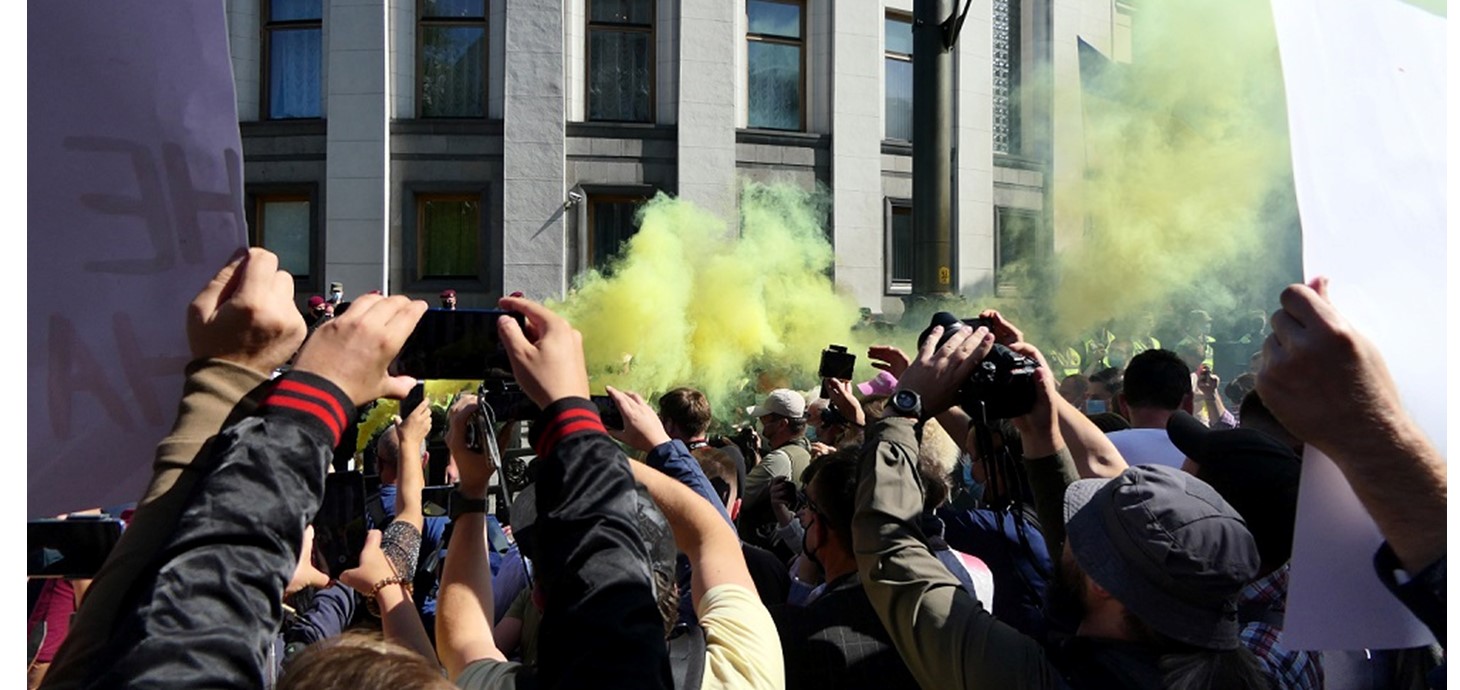
People filming a protest on mobile phones: open-source image, audio and video footage has huge potential for human rights investigations. The OSR 4 Rights project has helped courts assess this evidence more effectively
Research that is helping the UN and courts around the world to assess mobile phone evidence in war crimes prosecutions and other human rights cases, has been named finalist for a prestigious prize highlighting the impact of Swansea University research.
The Celebrating Impact Prize 2024, run by The Economic and Social Research Council (ESRC), recognises the wider social impact of the research that the ESRC funds in UK universities.
The shortlisted project, led by a Swansea University legal expert, is called “Strengthening the use of open-source research in human rights investigations”.
With mobile phones now so widespread, conflicts are increasingly being recorded by eyewitnesses and uploaded to the internet. This open-source image, audio and video footage has huge potential for human rights investigations and mass atrocity trials.
However, there are challenges in finding this information, verifying its authenticity, eliminating bias and, with huge volumes of data, processing and cataloguing evidence.
Professor Yvonne McDermott Rees of Swansea University School of Law, who leads the project, called OSR 4 Rights, explains:
“One of the main problems of using evidence from the internet is that the source is often unknown – does it belong to the person who posted or has it been reposted from another account? Is it misinformation or misattributed, claiming to be footage from Gaza in 2024 when it’s actually from Syria in 2017, for example? Platforms often strip the metadata that includes information on the time, date and location of capture, making it more difficult to verify.”
“Also, with thousands of hours of footage, open-source investigations can generate enormous data sets. Investigators need to be able to filter the most relevant information and ensure it can be preserved in line with legal standards.”
Find out more about the work of OSR 4 Rights
OSR 4 Rights was funded by an ESRC Transformative Research Grant from 2018 to 2021. It aims to strengthen the use and understanding of open-source information by investigators, lawyers and judges in the pursuit of justice for human rights violations.
The multidisciplinary team includes experts from Swansea University, Queen Mary University of London, Heriot-Watt University, University of Manchester, University of California, Berkeley, Human Rights Watch and HM Software.
The team’s work has already had an impact. For example, they developed technical tools to make investigations more efficient and systematic. These included a hate speech detection tool and FireMap, which enables investigators to map patterns of fires, such as the burning of villages. Previously, investigators would manually screenshot and store online information, but its Auto-Archiver tool automates the process, both capturing the information and preserving the chain of custody.
The team also provided training and guidance to organisations – including UN fact-finding bodies, Europol, Syrian investigators, the Foreign, Commonwealth & Development Office, INTERPOL, and United States Congressional staffers, as well as judges and lawyers in Iraq, Ukraine, and from international courts in The Hague – on evaluating the strengths and weaknesses of open-source information.
Professor McDermott Rees added:
“Being shortlisted for this Prize is recognition of the impact of the vital work that the OSR4Rights team has carried out. That work benefits investigators, lawyers and judges pursuing accountability for human rights violations. But the ultimate beneficiaries are eyewitnesses to atrocities, who often take enormous personal risks in recording and sharing evidence online, and the victims of those violations seeking justice.”
ESRC Executive Chair Stian Westlake said:
“The Celebrating Impact Prize is the Economic and Social Research Council’s way of recognising the remarkable achievements of the UK’s outstanding economists and social scientists.
I am proud that the Economic and Social Research Council has funded these valuable projects, and that we have the opportunity to celebrate the significant impact achieved.”
All finalists will have a film made about their work and its impact and have attended media training.
Winners are awarded £10,000 to spend on further knowledge exchange, public engagement or other communications activities.
The winners will be announced at an awards ceremony at the Royal Society in London on 20 November 2024.
